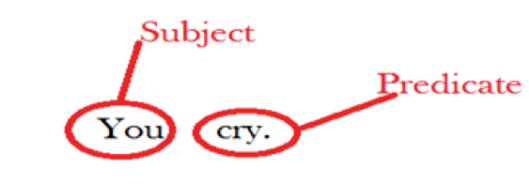

I love sentences.
Sentences are great.
Sentences make it possible to communicate.
However, people have been able to communicate without using complete sentences and incomplete sentences have seemingly taken their place. This makes some people sad, so in an attempt to make that petty minority happy, I will try my best to explain what a sentence is and what it is not.
A sentence is made up of words containing a subject (topic of the sentence) and a predicate (what is said about the subject). The predicate always contains a verb.

The subject can be a person, place, or thing.
Example of a sentence

The predicate always contains a verb.
Sometimes the predicate is only a verb:

While short, it meets the criteria for a sentence.
Sometimes a sentence only has a verb. This is called the imperative.
The imperatives in the form of a command don’t have to have a subject because the subject is implied.

If we’re running from a bear, every syllable counts. I don’t need to say “you” when I tell you to run for your life!
These are example of complete sentences. Complete sentences make sense and don’t leave me confused.
Incomplete sentences or fragments confuse me.
A phrase pretending to be a sentence:
Can’t type anymore.
There’s no subject.
This is an example of a phrase. A phrase is a group of words that lacks a subject and/or a predicate. When a phrase is punctuated like a sentence, it’s a fragment.
The phrase “The world,” confuses me because I don’t know what the world is doing (no predicate). It’s just a lonely subject. To fix this, this fragment can be attached to a sentence:
I’m so tired. Can’t type anymore. –>
I’m so tired that I can’t type anymore.
Alternatively, the fragment can be made into a new sentence:

In other situations, you could add a verb to make a fragment a sentence.
In that nifty book, Easywriter, there are a few examples of different types of fragments.
Fragments that start with transitions like also, for example, such as, or that:
I really like citrus fruits. For example, limes, lemons, and the majestic orange.
I really like to use “For example” to start off my sentences. It makes me feel smart. Unfortunately, using the transition in that way makes it a fragment.
I really like citrus fruits, for example, limes, lemons, and the majestic orange.
By connecting the phrase to a sentence, “for example” can be used without it being a fragment.
Fragments aren’t the biggest issue in the world, but making sure to write in complete sentences can really make a difference. We tend to speak in fragments in our everyday lives, but writing is different from speaking. Complete sentences convey a complete idea, which is central in communicating our thoughts. So by consistently writing in complete sentences, we can better connect with others.
What about texting in fragments?
Dunno.
Sources:
“What Is a Sentence?” What Is A Sentence? N.p., n.d. Web. 17 Sept. 2016.
Lunsford, Andrea A., Paul Kei. Matsuda, and Christine M. Tardy. Easywriter. Boston:
Bedford/St. Martin’s, 2014. Print.